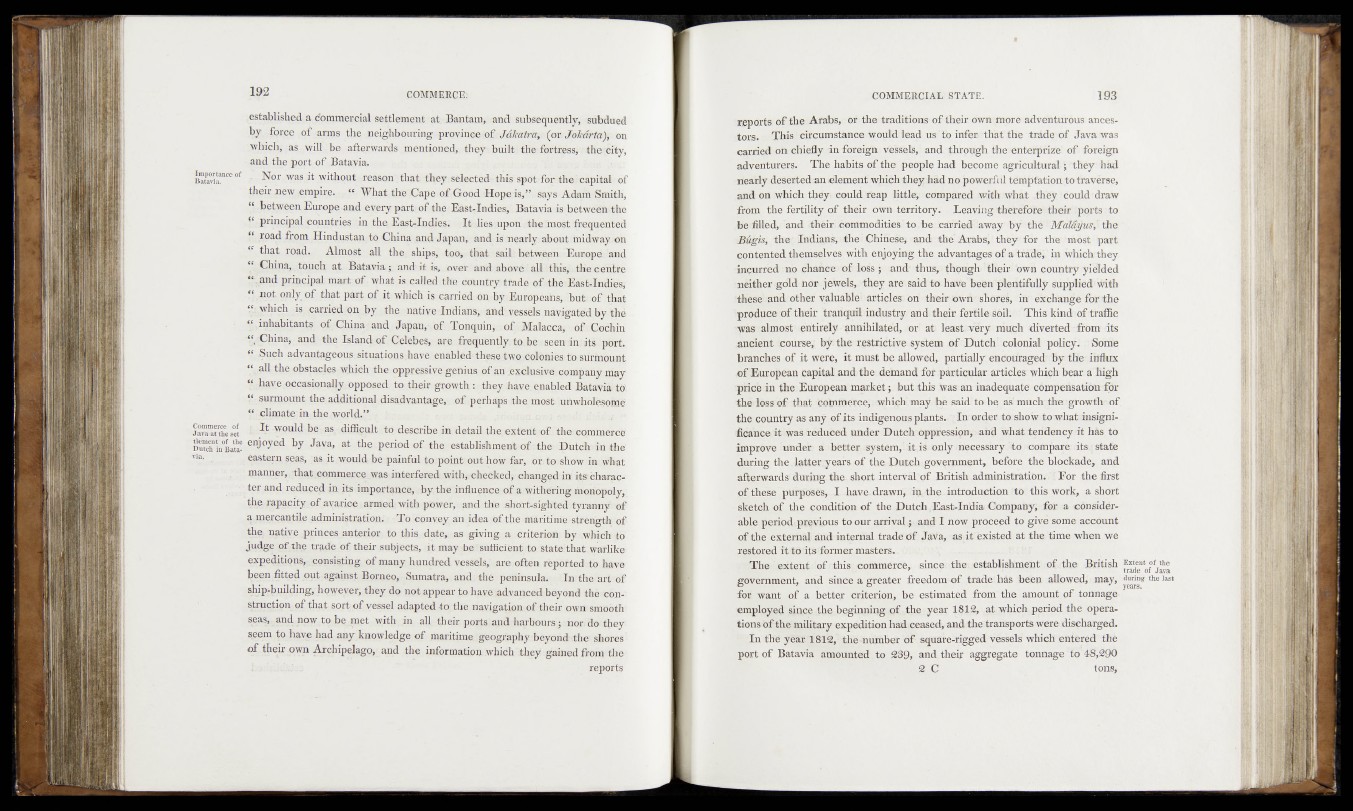
.established a Commercial settlement at. Bantam, and subsequently, subdued
by force ,qf arms the neighbouring provineeiof, Jakatra,. (or JoJcartufaon
which,-,as will/,be -afterwardst mentioned, theyjbuilt:the fortress,-. the^ity,
and the port-of Batavia.
0 ?aanceof ? -'^ or was it without -reason,that they*selected-this spot^fomthe“capital, of
their new empire. | “ What th,e -Cape of;Good -Hope is,5’.-says Adam Smith,
“ /between, Europe-and every part,,of the East-Indies, Batavia is betweëhsthe
;e: principal countries "in the, East-Indies. It .lies upon „vtheCmost -frequented
“ road from. Hindustan- to China and Japan, and-is nearly, about midway ;on
that road. Almost all the, ships, too, that sail between Enropédand
;China,. touch at Ba tav iaan d it is,. over' and above all this, ..the centre
“ .and principal m a r t of. what is called-the country1 trade of the-EastJndires,
SPty.of ^ a t part of.it which' is carriedón-By Europeans, :but»of that
is carried on ,by the native Indians; an dlvessèls. navjgatad by -thé
’ f(<> inhabitant^ o£Ghina;and Japan, of.Tonquin;-, oftyMalacca, roSiiCochin
^■;China, and the Island,-of Celebes, are frequently, bo, be»-seenrao^dts port.
V, Such advantageous situations.-h ave' enabled- these iwo^oloniësifo surmount-
‘/v! &b the obstacles which the oppressive gepius of an'fexofusjve.'Gompany may
V have occasionally -opposed, to their growth.:,-.they have.enabled Bataviaitö'
surmount .the. additional disadvantage, of .perhaps ithe most amwKolèsoHië
f climate;imthe world,” •
jüv“ «s°et t I* would bevasc difficult to describe in.detail th e ,ex te n t^ thercommefce
»Lu! eflj°yed by Java’ at tbe.period of the- establiShmeutidfethes Dutch-tin Ae
via. eastern seas, as.it would* be painful to point- out how for, oh tejshowunfvlbat
planner,,that;cqm_me£ce_,was interfered-.with^cèeóbedy changed in itsicbarac-
ter.and reduced .intits-importance, .by the ihftueimgpof a withering monopoly,
the rapacity, of ayarice^armed: with power,;. and-fhe üi'oïiKsighte^btyram^^f
a mercantile administration.', To convey, an idea of the maritimb>sbrength of
th?j B&tÏYP *princes.„anteriQr to this.- date,, as giving, a criterion; byiiwhrGbufcb
judge of the trade of their subjects, tit may be. 1 sufficient ito • stateithat warlike
expeditions, consisting of many hundred vessels,I-.are ?ofoen repbrtedtio have
been fitted put,against Borneo, Sumatra, and;th.é peninsula. Jmthernrjwof
^bfPfbh^diegdbe^eyer, they do not ,appear to have ;advancédshè,yond tbéac’&n-
Si^rJ?St'?9ri. 9^ ^bat sort'of;.vessel adapted-to"the navigation ofstbeir own>smÖöth
seas,r &nd now tob(|jpet with, in all their p.orts and harbours; .nor-do<-they
seem to haye had any knowledge of maritime, geography -beyond\the shores
of their own Archipelago; and the information which ;th^; gained from the
reports
reports of the Afabs, or the traditions of iheir. Ownmrpre adventurous ances-
dors» This circumstance koulddead usAo infec that .the träde of Java was
carried on chiefly -in-foreign vessels,' and through the enterprize of foreign
adventurers. '.--The habits of the people had become agricultural; 'they had
nearly deserted .-an element which theyhad no powerful temptation to traverse,
and on which tbby could ;r'eap little,- compared with what ,fhëy could draw
from the fertility of their own territory. Leaving-therefore their ports to
be-filled, 'land theirléommodities'to.be cäfriedlaway' Üy't\iè'f'Maïatfm,rthe
Migis, the Indians,.the/'Chinese; and' the Arabs', 'they'for th e ‘most part
contented themselves; with enjoying. ,the advantages-of a tradfe,' in which'they
incurred nb chance) of; loss ; and' thus,; though-' their bwb country yiSTde.d
neither -gold nor- j ewels, they are-jsaid to -have been plentifully supplied--with
'these and other valuable1’aatiples:-bn their own ’ shores, in exchange for the
produce of. theit tranquil industry- and-.their fertile coil; This kind of traffic
was almost'' iehtii®ly auuihilated, -0rI at; least-wiry niu;ch divertedfrom: its
ancient .course* by the restrictive system of Dutch' colonial policy. Somé
branches of (it wpre, it must be allowed, partially encoriraged'by the- ihflux
,of'European capital and the demand for particular articles" which bear a high
price in the. European market; but this kas^annmdequate'ebmpehSatiDn'fffi
the»loss of .that fco'mtüerce,. which may be said'to bp asfmuch- th© growth-of
the country as any of its indigenous plants. • In ordet tb.shoW lowhatrinsigni-
fibahee i t was r educed under Dutch oppfessipn; : and whät tendency rit has to
improve -under- a better .system,; it, is .'onlyirteeessary itO .compare dtsq state
during the .latter;years,of the, Dutch.government, befqfe,.the;,hlockade, and
afterwards-' during the. short interval .Of British .administration.,*3 For *the first
qf these purposed, L.have. drawn, dffi-the...mtroduction. 'tb ' this work, a short
sketch of the condition of the Dutch,-East-Inclia Company; for a eónsidér-
able.periodptqyious to our arrivals ,,and I now proceed to gfivg some-account
of the external and internal trade o'f Java, asitAxisted at the time when we
rgftored ittöatsiförmer masters..
'•A?be'teüeaffiof this mfonaerce^ since---theuesfoblisbinaeDt of,the British
government, and since a greater freedaimef trade has been allowed,-may, during the jast
for want .of a bettej criterion, ber estimated from'the amount, pf tonnage-
employed sjnpe the beginning of !;thq . year 1812,. at.; Wbich, period thé opera-
tions:bf the military expedition hadteeased, and the. transportS were discharged.
In the year-1812, the-number o'f- squäte-rigged vessels which entered 'thé
port of Batavia amounted , to 239, and. their aggregate tonnage 'ïö '4^,290
2 "& • fobs;